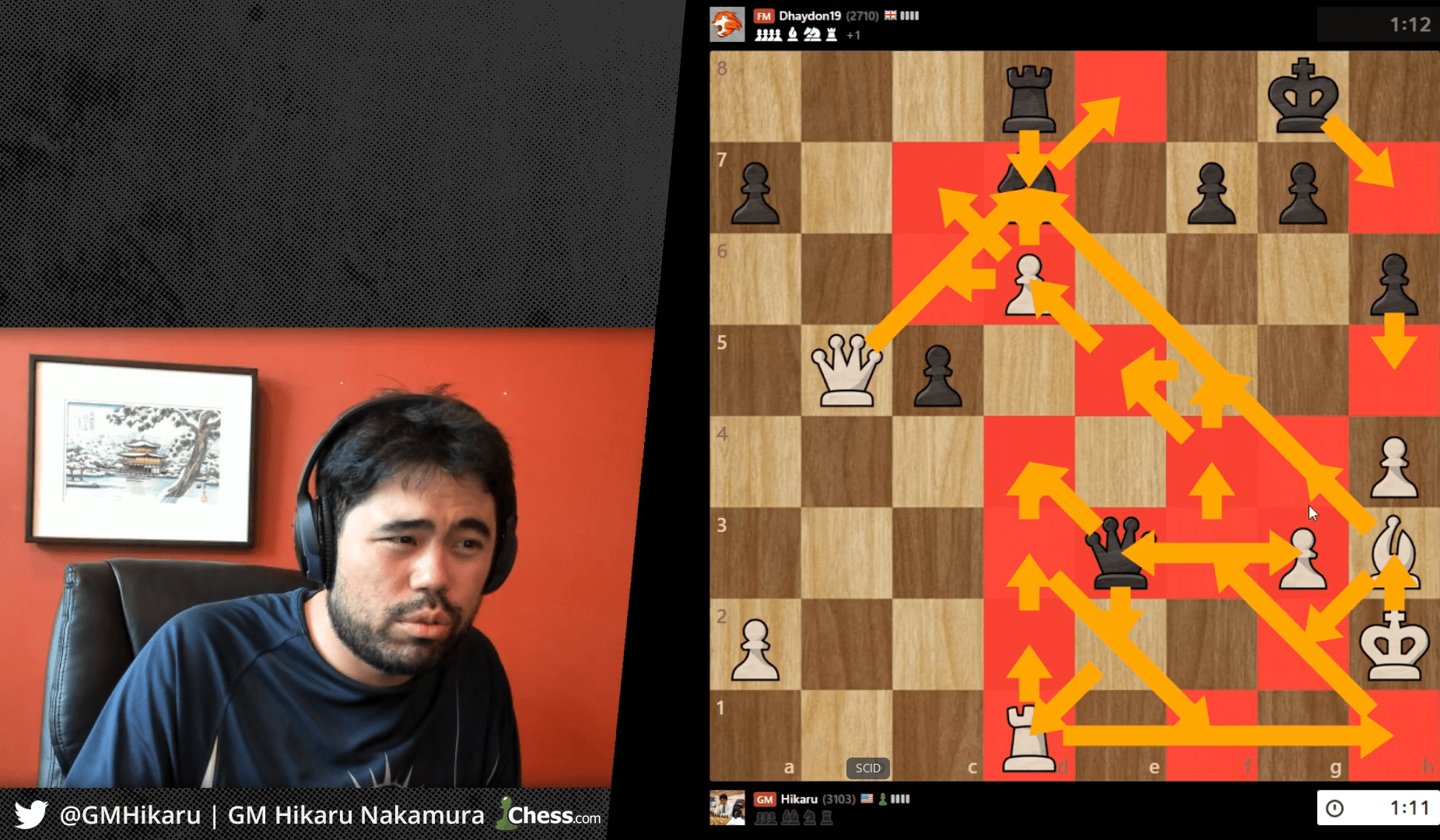
Why Don't I Play Serious Chess?
josephyossi: “Why don’t you play games?”
JS: Almost everyone has some sort of job. My job is chess. For decades I played in many tournaments, winning the American Open, the National Open, the U.S. Open, and other events. And there just wasn’t any money there. Strong chess people just love the game and accept the fact that they will live on a park bench forever. I quit tournaments in 1999 and decided to write; writing is less stressful than playing.
So my answer is easy; I don’t play games anymore. I write about chess and teach. Time for me to go back to my park bench now.
ChessTalisman: "I was wondering if you could clear a doubt of mine. I have gone through your book How To Reassess Your Chess. I really appreciate you for explaining the planning part, but I’m facing an issue and that is, 'Deciding the best plan.' Often at times, I face a situation where I find multiple plans that are attractive, but I can’t decide as to which plan I should choose. Your thoughts on this will surely be appreciated. Thanks in advance!"

JS: It would be better if you sent me some games where you have “multiple attractive plans” (even three multiple plans are rare). But, it’s too late now. So, I’ll give you the following:
After the opening (If you don’t know what your openings are all about, you will sink into a dark, confused world of your own making.), you can follow the plan you embraced during the opening (though that might not be useful at that point), or you can look for another. However, you can’t really do that if you don’t understand where/what the pawn structure is.
Since I can talk about this stuff forever (meaning I don’t have enough time), I’ll give you a taste of what a plan is:
Simple Plan with a Hard Fist
What plan would you use? If you thought "so and so" as a plan, you’re not creating a plan, and you don’t know what a plan is. A plan isn’t a random but pretty idea, it’s using your pieces and pawns to maximize your position (based on the positions of both sides armies).
White played the opening poorly (and 7.b3? made things worse), but ignoring castling was a big mistake.
Two points:
- Stopping White’s king from castling.
- Black’s doubled pawns are actually a good thing!
A Multiple Plan Situation?
Here’s another plan, and it seems that this really is a multiple-plan situation. Or is it?
If you decided on another plan, you’re on the wrong road. Yes, Black has many choices. For example, 1...b5 grabs queenside space. Very juicy. Or getting your kingside rook off the useless square on f8 and moving the rook to e8. More? Okay, 1...Qh4 or 1...Qd7. And on and on it goes. Can we really say that those moves are plans? Sure, why not. If it’s the best you have, then play it.
Black is much better since his minor pieces are more active. However, that’s not enough. Black has to gain other plusses if he is going to win. To do that, Black has to gain kingside space by using his f7-pawn.
Once again, finding the best plan can be very, very difficult. But if you feel that a plan (or plans) will help you, then go for it. As they say: “A good plan is better than no plan.”
svanefollower: "Which books do you generally recommend for improving chess players?"
JS: You might think this is easy, but it’s not. Recommending a book is tricky, and a book that is useful for some might be useless for others. If you wish, tell me what books you own and what you think about them. And what kind of books are you looking for? Endgames, tactics, openings, games, and on and on it goes. Give me more about this, and we can try again.
Hmmm… You just wrote that you bought How to Reassess Your Chess (hopefully the 4th edition). As you read it, feel free to ask questions about it.
Anyway, here are some of my favorite books. First, the books that everyone loves:
The Books That Everyone Loves (or should love)
- Tal-Botvinnik, 1960 by Mikhail Tal
- My 60 Memorable Games by Robert Fischer
- The Life & Games of Mikhail Tal by Tal
- My Best Games of Chess by Alexander Alekhine
- My Great Predecessors Volumes 1-5 by Garry Kasparov
Those five books should be on every chess player's shelf. After that, it’s everyone for himself.

My (present) Favorites
Okay, my favorite books change over and over, but at the moment this is it!
- The King by J.H.Donner (an incredible read)
- The Great Chess Masters and their Games by Fred Reinfeld (history)
- Bent Larsen’s Best Games by Bent Larsen
- Aron Nimzowitsch, On the Road to Mastery 1886-1924 by Per Skjoldager and Jorn Nielsen
- Aron Nimzowitsch 1928-1935 edited by Rudolf Reinhardt
- Chess Gems, 1000 Combinations You Should Know by Igor Sukhin. Gives you combinations and history!
MTawhid07: "I don’t have enough money to learn chess from a coach nor money to be a premium member of this site. All I can rely on is online pdf books since hard copies are very expensive. I am a university student. I hope my condition will improve one day. I am a new chess player. I love chess a lot. Can you give me some suggestions on how to start to learn chess better and be good at it?"
JS: Dear Mr. MTawhid07, there are many ways to enjoy chess, and you don’t have to spend much money to do so. For example: Play online games (free), and learn by reading articles (a zillion of them, free on Chess.com). By doing those two things, you’ll get better and better. And if you only have a few pdfs, well, read them!
As for a coach, I never had one. When I was 12 years old, I used my pennies (My family was very poor.) to buy a book or two about grandmaster games and chess history. I would have loved to own some pdf books in those days, but there weren’t any. Such things were just science-fiction dreams.
 |
Are you searching for an affordable coach? Check out our Chess.com coaches page for some great instructors! |
The Only Way To Get Better
- Play as many online games as possible. It might teach you something, or it just might make you happy.
- Keep in mind that chess is fun, so even if you lose a ton of games (I certainly did when I was young.), you should smile, win or lose.
- You can find most of my old articles if you look a bit. Or look for articles by other authors.
Here’s a part of an old article I wrote. It's choppy since I cut it up, but it should help you.
"Let’s say your goal is to become an international master. In general, a player wanting to reach that level needs to go over 100,000 games and up. (The vast majority can be looked over very quickly, while you will want to spend some time on others.) This allows him to see and subconsciously absorb the many structures and patterns that are must-knows if a player is to reach a very high level.
"In my own case, I learned how to play chess at the old age of 12. However, I became absorbed by chess and worked on it for at least eight hours a day, every day. I only went to class twice a week during my junior-high and high-school years, preferring to stay at home and stare at a chessboard… Of course, I still got all A’s. I became a master-strength player by 16, but since I lived in a bad chess area, I didn’t obtain a master ranking until I left home and moved to San Francisco at age 18. I eventually got the IM title, but only after getting sidetracked by various aspects of life in the rip-roaring Haight Ashbury.

"When starting out you need to create goals that can be realized within reasonably fast time-periods. That way you feel like you're accomplishing something. If your rating is 1200, make your goal 1400. Figure out the things a player of that rating needs to know, and then learn as much as possible. Collect information from practice, books, articles, computer programs, and lessons. I wish I had some of those things. Alas, in my youth, there were no chess computers, but (as I mentioned), I still managed to break through.
"Is it possible for a player who is just starting out at age 21 to make master? Yes, though it will take time and hard work. Is it possible for that same player to get an IM title? It’s been done before, but it’s rare and requires an enormous commitment to the game. However, why put that “grandmaster or bust” monkey on your back? Keep your dreams, and do your best to make them happen, but be realistic and go one step at a time by the repetitive 200-point goal leap that I’ve mentioned.
"Please understand that one book on tactics won’t get the job done. You need to set up (or have someone else set up) a serious study-program that allows you to become proficient in all areas of the game.
"Finally, the real reason to play chess is because it’s a rush and is also a creative outlet. When I was playing professionally, winning a tournament was no big deal. However, winning a game that I deemed to be artistically pleasing was everything to me! A professional has to love chess, love its history, and love looking at every facet of it. There’s not much money in the sport, but that love makes everything worthwhile. I wish you the best."






